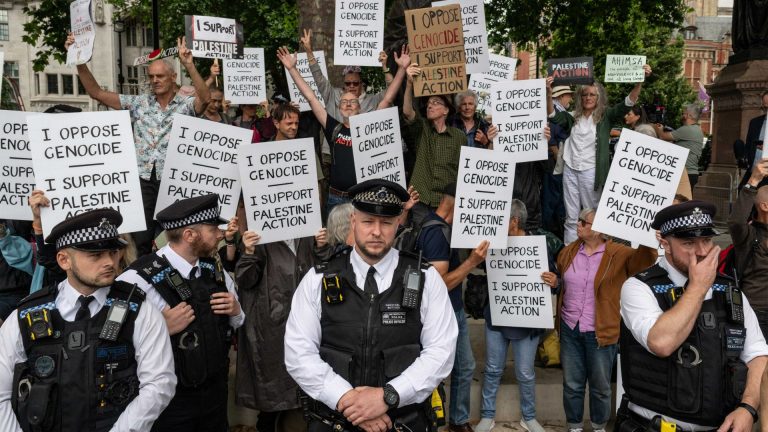Paul Mason seems to know a lot about Palestine Action (“Palestine Action is bad for Palestinians” TNW #443), outlining the reasons he considers proscription of the group to be appropriate. Others may think that the activities of Palestine Action (although clearly unlawful) do not constitute terrorism and that proscription will have a chilling effect on protest movements in the UK. Unfortunately, many fear that voicing these concerns may be interpreted as expressing support for Palestine Action, which could lead to arrest, prosecution, and a long prison sentence. Does Paul Mason consider this acceptable in a democratic society?
Mary Seneviratne
Sheffield
Paul Mason writes “let’s make this about the Palestinians, not PA” while dedicating the whole article to Palestine Action and the government’s (supposedly correct) decision to proscribe it. It was a disappointing read after the brilliant and informative article from Matt Kelly last week (“Meanwhile, in Gaza…” TNW #442), who actually made it about the Palestinian people and the terrible silence of our leaders.
Ffion Gomersall
Paul Mason’s beautifully written assertion that direct action by PA will be detrimental to Palestinians follows his remarks in his review of John Cassidy’s book (“Can we replace capitalism?” TNW #442) that “no street protests have changed the world”. When parliament chooses not to listen and the media only reports what suits them then peaceful protest is useless. Can he tell us how to proceed?
Christopher Grey
Suggested Reading


Palestine Action is bad for Palestinians
(Re “Alastair Campbell’s Diary”, TNW #443), Donald Trump is so complicit in the way Israel acts with impunity, and along with his vice-president, he is potentially a danger to the whole world. When I was a mental health professional, being a danger to self or others were among the grounds for sectioning under the Mental Health Act. There again, perhaps most of us would qualify for a DSM-5 TR diagnosis of one kind or another.
Roger Gordon
North Shields
Anthony Baws (Letters TNW #443) writes “If Hamas releases all hostages and agrees to an unconditional ceasefire, the war will end.” It has been Israel that has stood in the way of a ceasefire.
Keith Tunstall,
Chichester
I read Anthony Baws’s letter with a mix of disappointment and resignation. It is remarkable – though sadly not surprising – how successfully the prevailing narrative insists that all the trouble in Palestine began on October 7, 2023.
This is not only naive but dangerously untrue. To ignore decades of systematic oppression, subjugation and repeated massacres – long before Hamas even existed – is to distort history and enable the propaganda that sustains this cycle of violence.
Seán Hogan
Ireland
Zoë Grünewald’s piece (“What makes the Finns so happy?” TNW #443) asked why the Finns were so happy and why the British are not. I walked past today’s newspapers when out shopping and the headlines were shouting out hatred and bile. People will see those headlines as fact and not opinion. Until that changes we will remain on a downward spiral.
Chris Hooper
Bristol
Many years ago a regimental commander sent his officer appraisals to the War Office. All were above average. Whitehall insisted there had to be Below average/ Average/ Above average, to which his response was: “I only have above average in my regiment”. I’m reminded of this when I read Tom Baldwin (“It’s the values, stupid” TNW #443) refer to working people as “ordinary”. I have yet to meet anyone ordinary, regardless of position in life. We all have a particular contribution to make, regardless. I found it demeaning to be referred to as ordinary, and I suspect so do many others.
John Eustace
Warwickshire
Tom Baldwin is correct, that there have been pragmatic successes for Keir Starmer, especially on the international stage where he exudes warmth and credibility and not the woodenness we get domestically. His disconnect with his backbenchers requires urgent attention, because they are fast losing heart. But there is time to turn it around, if he is willing to listen.
Judith A Daniels
Great Yarmouth, Norfolk
There are fewer buddleias than there used to be (“On looking away” Nigel Warburton, TNW #443). When I was a little boy growing up in Bristol “buddleia” was quite a difficult word, so we called them “bomb site weeds”. But widespread bomb sites whose main use was as habitat for buddleias and butterflies are now a thing of the past.
Tim Ward
As Peter Trudgill notes, (“Are Reform UK ‘dumb’ or just plain stupid?” TNW, #443), Dumm is German for stupid. When the Brexit referendum result was announced, the German newspaper Bild reportedly considered running the headline “United KingDUMM”, but changed it to the more polite “OUTsch!”, out of respect for our feelings. I think they were right first time.
John King
Stratford-upon-Avon
Peter Trudgill (“Ange Postecoglou: a moving family history” TNW #442) writing about Greek family names. I always understood that names ending in –ou were the feminine version of family names ending in …os. Like for example Mr Notopoulos but Mrs Notopoulou.
Gisela Greenaway
East Grinstead
Thank you for highlighting the horrific plight of the hundreds of thousands of children in Gaza (“Meanwhile, in Gaza… TNW #442); it sickened me to see the front-page photograph of an emaciated Palestinian child. My sense of outrage was intensified when I looked on my phone and saw newsfeed headlines that said that Israeli airstrikes had killed 10 children near a clinic in Gaza.
According to UNICEF, more than 50,000 children have been killed or wounded in Gaza. Without an arms and trade embargo on Israel and severe sanctions, many thousands more Palestinian children will starve and be slaughtered. Anything less, is moral cowardice – and complicity in war crimes, crimes against humanity, and genocide.
Chris Fitzpatrick
Dublin

BELOW THE LINE
I don’t doubt Starmer’s values or basic decency (“It’s the values, stupid” TNW #443). The great test will surely be the government’s commitment to tackling child poverty. There’s still time for an approach that can transform children’s life chances and (I hope) regain support among disaffected voters tempted by parties to the right and left.
Louise Willmot
I’ve always voted Labour but shall no longer do so. Aside from the attacks on the poor, I’m outraged at Starmer’s support for Netanyahu. The increasing prohibition of the right to protest looks like the thin end of a very sinister wedge.
Michael Rosenthal
British politics is uniquely vulnerable to short-termism (“Some people just won’t listen”, TNW #443). And the political culture is often too focused on blaming “the other lot” for some mess or other they find difficult to solve. Farage thrives on being seen as a “none of the above” politician – but he would run a mile from actual government office.
David Rolfe
I like Oasis, (“Oasis: the trauma and the glory” TNW #443) but they are a bit like beans on toast. Alright, but you wouldn’t want it all the time.
Denny Ford



